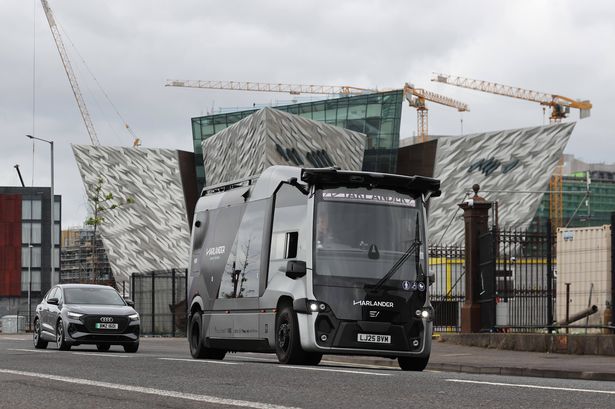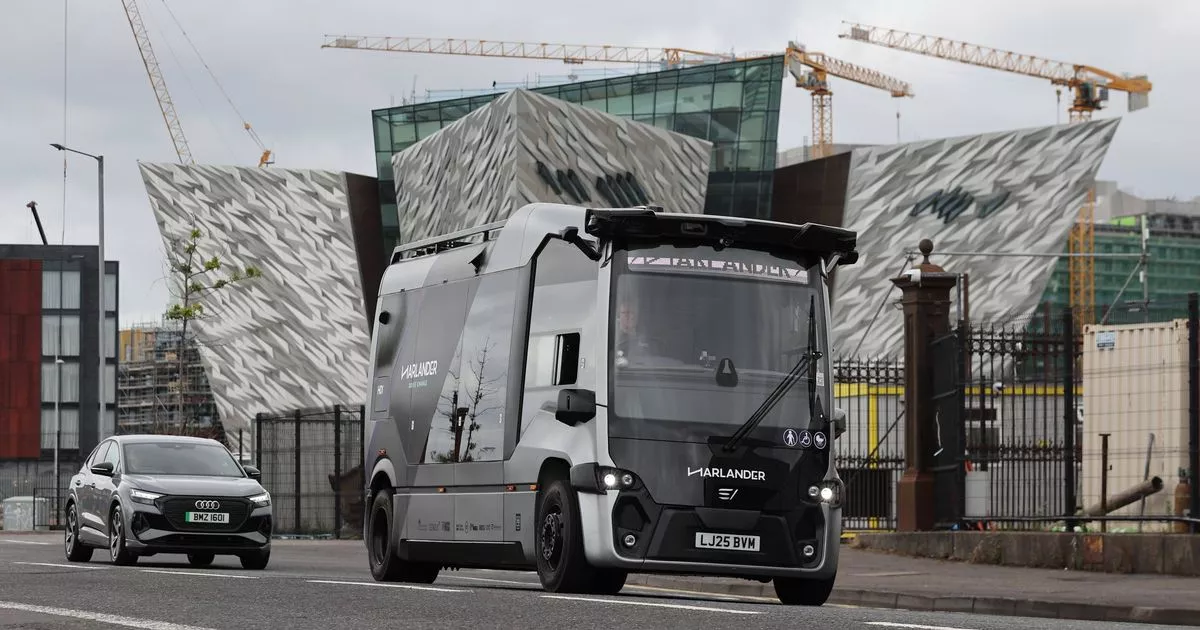It seems the public is not ready for the arrival of driverless vehicles despite Northern Ireland’s first self-driving bus currently being tested in Belfast Northern Ireland’s first self-driving vehicle, Harlander, which has begun operating in Belfast’s Titanic Quarter(Image: Liam McBurney/PA Wire)
Northern Ireland’s first self-driving vehicle, Harlander, which has begun operating in Belfast’s Titanic Quarter(Image: Liam McBurney/PA Wire)
Despite Northern Ireland’s first self-driving bus currently being tested in Belfast, it seems people are still not ready for the arrival of driverless vehicles.
Over three-quarters of Northern Ireland motorists have admitted they would not feel safe travelling in a driverless vehicle, according to new research.
The car insurance experts at CompareNI.com surveyed 800 drivers across NI to find out their attitudes toward autonomous vehicles (AVs), revealing that the overwhelming majority are sceptical of the new technology and reluctant to embrace it.
READ MORE: Driving test postcode lottery: The pass rates at Northern Ireland test centresREAD MORE: How much elderly drivers in Northern Ireland are paying for car insurance
Earlier this year, the UK government delayed the rollout of driverless vehicles until late 2027 as it strives to build public trust. While limited self-driving technology is permitted on UK roads, a human driver must be at the wheel to supervise and intervene if needed.
But several companies are already testing more advanced tech across the UK. In Belfast, NI’s first self-driving vehicle – the Harlander shuttle bus – is giving passengers at Titanic Quarter a taste of the future. Meanwhile, Uber has teamed up with tech firm Wayve to launch trials of driverless taxis in London next spring.
Commercial robotaxis are already operating in several cities across the United States, where there has been a rapid rise in ridership, with over 250,000 paid trips each week, highlighting that people are becoming more willing to entrust their safety to AI-driven vehicles.
However, a new study by car insurance experts at CompareNI.com has found that there is still a long road to travel before the public in Northern Ireland has full confidence in driverless vehicles.
The survey showed that 80% of people would not feel safe travelling in an AV. Two-thirds (66%) of respondents held a negative opinion of autonomous technology, compared to just 18% viewing it in a positive light.
When asked what their biggest concern regarding AVs were, nearly a third (32%) were worried about not having any control of the vehicle, while 29% said they don’t trust the technology. Almost a quarter (23%) had fears over the behaviour of other road users, while 15% cited the condition of NI’s roads as their main concern.
Ian Wilson, Managing Director and car insurance expert at CompareNI.com said: “While it might seem like science-fiction, autonomous vehicle technology has come a long way over the last decade and is steadily becoming a reality. With robotaxis slowly expanding across the USA and trials due to begin in the UK next year, this technology looks set to become part of our daily lives in the not-too-distant future. However, there is a lot of work still to be done to shift public attitudes towards driverless vehicles.
“While fully autonomous vehicles promise to bring several benefits over human-driven vehicles, including improved road safety, lower emissions and reduced traffic congestion, our survey showed that many people still have understandable reservations about this technology. Tellingly, a whopping 94% of people believe the planned 2027 rollout of driverless cars in the UK is too soon.
“A big question a lot of people have is how this will impact insurance and who would be liable in the case of a collision? Would it be the driver, the manufacturer, or the software provider? In our survey, over a third (36%) of respondents felt the technology provider should be legally responsible for claims involving driverless cars, while a quarter felt the onus should be on the manufacturer.
“For driverless vehicles to gain widespread acceptance and become mainstream, car manufacturers, tech firms and insurers will need to work together to bridge the trust gap that currently exists and make people feel safe and comfortable.”
For all the latest news, visit the Belfast Live homepage here and sign up to our daily newsletter here.
